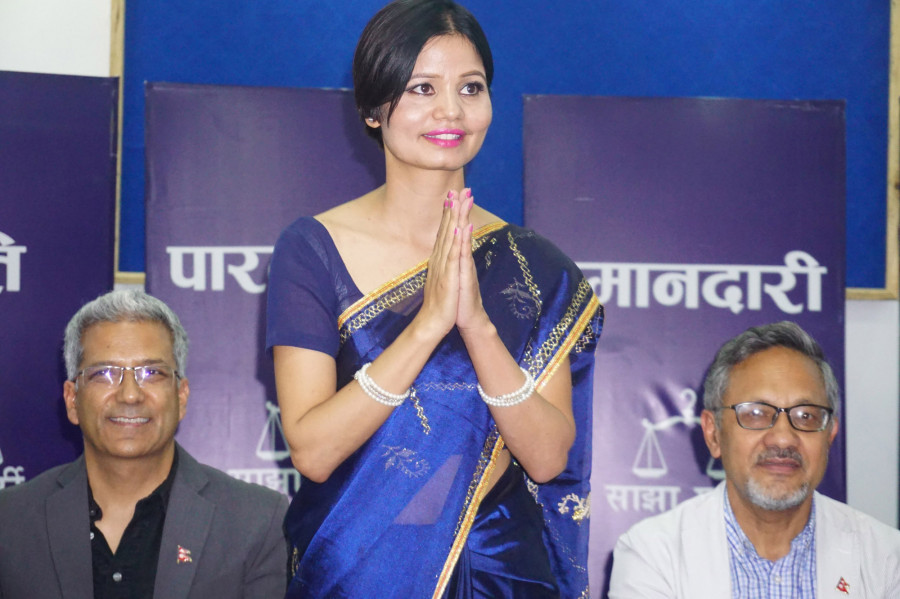Opinion
Women shouldn't be forced to wear the sari in formal settings
If women's clothes had pockets in them, they wouldn't have to face difficult situations.
Sabitri Gautam
Three women candidates—Bidya Bhattarai of the Nepal Communist Party, Rajani KC of Sajha Party and Jamuna Sharma of Bibeksheel Nepali Dal—are contesting for a parliamentary seat from the same constituency in Kaski in the forthcoming by-election. Bhattarai recently received uncomplimentary media coverage after a photo showing her and a man carrying her handbag during an election campaign was published. The purse bearer was later revealed to be her brother-in-law. The spotlight turned on KC when the sari-clad candidate gave a campaign speech clutching a cell phone in her left hand. These incidents show that the way politicians appear in public matters a lot.
People are expected to behave in a mature and formal way after reaching a certain age, getting married or joining a particular profession. Traditional attire is believed to help create this public persona. Male politicians switch to daura-suruwal or kurta-pajama, and female politicians don saris during their election campaign or after becoming ministers to appear mature and formal.
During the election campaign, Bhattarai, who was wearing a coat over her sari, was apparently having a hard time keeping her handbag from slipping off her shoulder as she was greeting everyone with a namaste, and her brother-in-law came to the rescue and offered to carry it. And KC, when she was addressing the crowd during her election campaign, was forced to carry her phone in her hand because her clothes did not have any pockets. If women politicians were allowed to wear convenient clothes with pockets or carry long strap bags, she wouldn't have gotten into this predicament.
The sari is believed to have originated in the Indus Valley civilisation that flourished five thousand years ago. During that time, unstitched outfits were believed to be auspicious, and so the sari was popular wear. Men also wore unstitched clothes like the dhoti which many don't wear today. But the sari is still the most popular outfit among women in South Asia. It is the national dress of women in Nepal, India, Bangladesh and Sri Lanka. Men have moved to many convenient 'cultural' outfits whereas women are still struggling with the unstitched, pocketless saris. There is also a prevalent assumption that it is awkward to carry a big bag on the back or wear sneakers when wearing a sari.
I have a memory of seeing my mother and aunties learning to ride a bicycle in the night by wearing kurta suruwal, which they had made to wear during a pilgrimage. As everyone was used to seeing them in saris, they were hesitant to be seen in the afternoon at home in anything other than a sari. Today's Eastern women are adjusting with small 'sari bags' due to the unavailability of functional pockets in saris. Some Indian fashion designers are trying to be innovative.
Some sensible women all over the world have been revolting for rational dresses throughout the years. They fought to get pockets sewn directly to their garments. Clothes represent culture, culture cultivates habit, and the habit eventually becomes a choice. Comfort and choice do not necessarily guarantee convenience. For me, the newest politicians defending traditional attire as their 'choice' and 'comfort' is nothing more than a political strategy to cash in on conformists' psychology.
I remember reading an old interview of writer Fatima Bhutto, the niece of the late Benazir Bhutto, a former prime minister of Pakistan, where she had said that the younger generation of women in the Bhutto family doesn't see Benazir as their idol. One of the reasons for this, as Fatima said, is that her grandfather Zulfikar Ali Bhutto, a liberal, never made the women in his family cover their heads. But when Benazir joined politics, she started doing so as a political 'move'; just to flatter the fundamentalists and to win their votes. Hence, it's not about the outfit; it's all about the courage of detesting older tastes, breaking the mindset of society and one's own.
***
What do you think?
Dear reader, we’d like to hear from you. We regularly publish letters to the editor on contemporary issues or direct responses to something the Post has recently published. Please send your letters to [email protected] with "Letter to the Editor" in the subject line. Please include your name, location, and a contact address so one of our editors can reach out to you.




 22.84°C Kathmandu
22.84°C Kathmandu










